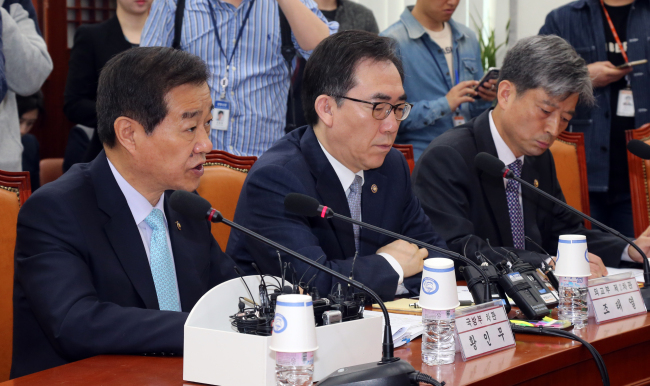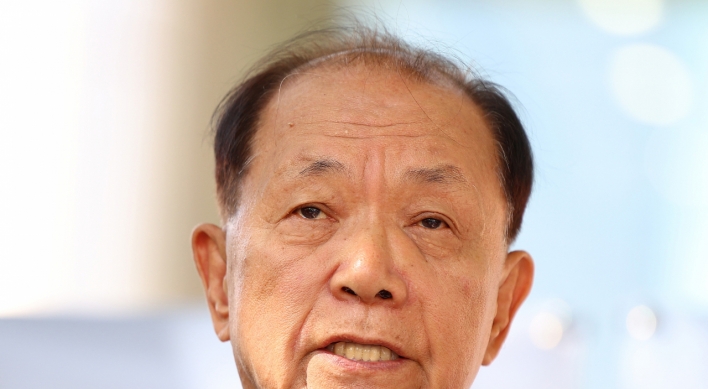South Korea’s Defense Ministry said Friday that it is to conclude the annual joint military drills with the U.S. on Saturday, but continues to be on high alert against possible nuclear testing or ballistic missile launch by North Korea.
“The largest drill ever -- consisting of 300,000 South Korean troops and 17,000 U.S. soldiers -- had conducted various responses against the North Korean threats, and was successful in boasting the strong will and potency of the Seoul-Washington alliance,” said ministry spokesman Moon Sang-kyun.
The drills included deployment of additional U.S. forces in the Korean Peninsula, amphibious landing drills and responses against nuclear and missile threats by Pyongyang.
But Moon said the military is on its toes over concerns that the North may carry out yet another demonstration of its arsenals.
“The largest drill ever -- consisting of 300,000 South Korean troops and 17,000 U.S. soldiers -- had conducted various responses against the North Korean threats, and was successful in boasting the strong will and potency of the Seoul-Washington alliance,” said ministry spokesman Moon Sang-kyun.
The drills included deployment of additional U.S. forces in the Korean Peninsula, amphibious landing drills and responses against nuclear and missile threats by Pyongyang.
But Moon said the military is on its toes over concerns that the North may carry out yet another demonstration of its arsenals.

On Thursday, the communist state fired its intermediate-range Musudan missile at 6:40 a.m. and 7:26 p.m. After the North’s Musudan launch on April 15 ended in failure, the ministry officials had said that the next launch will probably occur much later.
“Considering that the North is pushing ahead with firing Musudan despite continued failures, we cannot rule out the possibility of an additional launch. There is also high possibility of (the North) conducting a nuclear test in the near future,” Moon said, adding that Pyongyang appears to have completed preparations for the test.
The U.N. Security Council convened an unscheduled meeting on Thursday, upon request of the U.S., to discuss Pyongyang’s recent missile launches.
U.N. spokesman Stephane Dujarric called the actions “extremely troubling” and urged the North to cease any further “provocative actions” while complying with international obligations. Pyongyang is currently under powerful economic sanctions slapped by the U.N. since last month.
Member states of the council reportedly agreed to adopt a press statement condemning the launches, expected to be announced Friday.
The rare double launch on Thursday is only the latest in a series of teeth-baring demonstrated by Pyongyang’s leader Kim Jong-un, before the country’s ruling Workers’ Party of Korea holds its first congress in 36 years.
Citing unnamed sources, Yonhap News Agency reported that the North has heightened surveillance along its borders with China along with monitoring of its people ahead of the party congress on May 6.
The hermit kingdom has effectively shut down Pyongyang -- the capital and venue for the event -- by restricting people’s entry and banning ceremonial events like weddings or funerals.
There has been speculation that Pyongyang may conduct another nuclear test before the congress to decorate its youthful leader. Military officials refused to comment on this matter.
South Korea’s Unification Ministry said Friday that the Musudan’s launch may be to show off the regime’s accomplishments ahead of the party congress.
But in lieu of demonstrating its self-proclaimed strike capacity, the multiple launches of Musudan have only raised doubts.
The intermediate-range Musudan has been deployed to front lines since 2007, but had never been fired prior to April. Its presumed maximum range was 4,000 kilometers, which would have put U.S. military range in Guam within its striking distance.
But the series of failures have military officials questioning whether it can be considered an actual threat.
“North had claimed its deployment, and while it did operate troops accordingly, the actual capacity (of Musudan) has been a mystery. We could say that we have some confirmation about its capacity through the launch,” said a military official.
According to the Joint Chiefs of Staff, all three of the missiles only flew for seconds -- a minute at most -- before plunging or exploding mid-air. A JCS official said Thursday’s botched launch was very similar to that on the 15th, which marked the North’s founding leader and Kim’s grandfather Kim Il-sung’s birthday.
Jeong Joon-hee, the Unification Ministry spokesman, said the North is pushing ahead with the launch under direct orders from Kim.
The repeated failure of Musudan also cast shadows of doubt over the North’s KN-11 submarine launched ballistic missile that uses the same engine.
Last Saturday, Pyongyang conducted an underwater launch of the SLBM, evaluations of which varied from failure to “partial success” from experts.
By Yoon Min-sik
(minsikyoon@heraldcorp.com)






![[KH Explains] No more 'Michael' at Kakao Games](http://res.heraldm.com/phpwas/restmb_idxmake.php?idx=644&simg=/content/image/2024/04/28/20240428050183_0.jpg&u=20240428180321)












![[Herald Interview] Mistakes turn into blessings in street performance, director says](http://res.heraldm.com/phpwas/restmb_idxmake.php?idx=652&simg=/content/image/2024/04/28/20240428050150_0.jpg&u=20240428174656)
